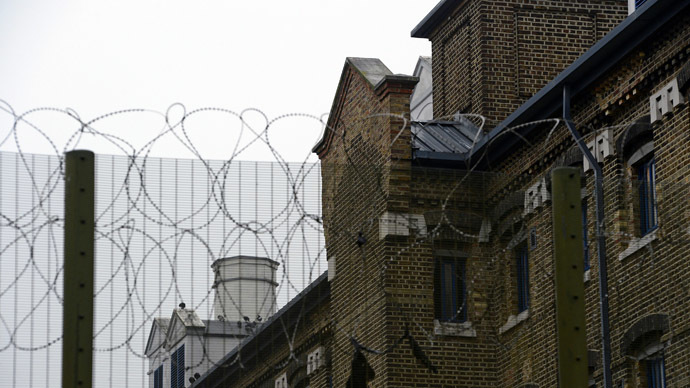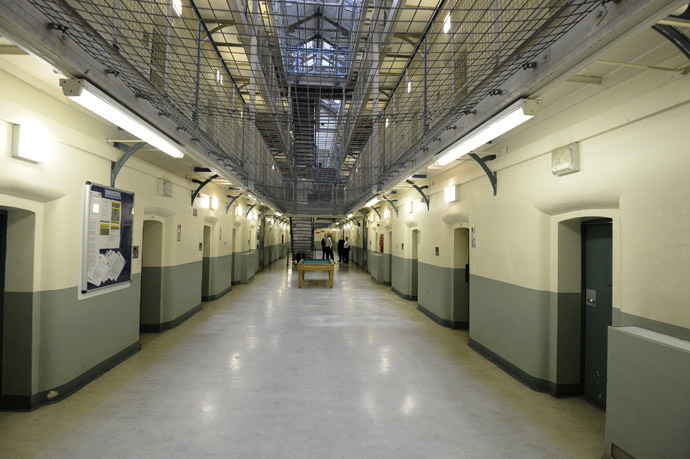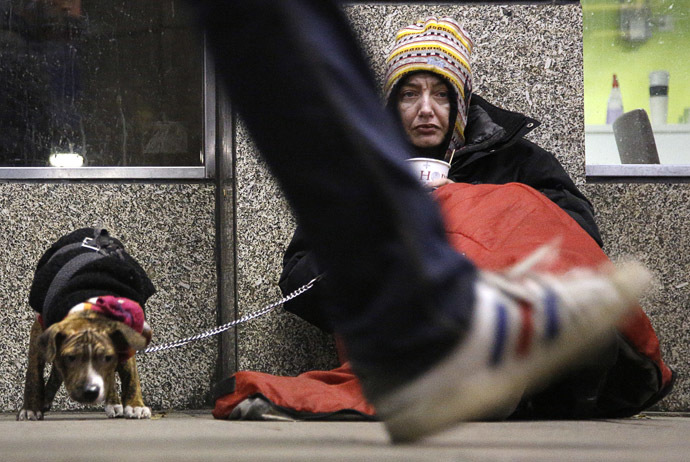Criminalized poor are swelling Britain's ‘labor camps’

Click! Another notch on the ratchet turning the UK from civilization to fascism this week as Britain's Justice minister, Chris Grayling, announced ten year jail sentences for those who claim too much state benefit.
The latest statistics from the Department for Work and Pensions
(DWP) show that £1.3bn was fraudulently claimed in 2012/13. Tax
Justice Network figures estimating tax fraud by the super-rich at
£60bn, which is around 50 times greater, seem to have 'evaded' Grayling; as has the
estimated five times greater figure of £10bn in unclaimed
benefits.
The sad fact is simply that tyrants are running the show and rather than pay their fair share they intend to squeeze the poor until the pips squeak.
Most government legal aid has also been cut off this year while
destitute squatters who manage to find a derelict or empty home
to spend the night have also been turned into criminals for the
first time in British history. Rather than the wealthy owner of
the empty property having to pick up the eviction tab, now it's a
job for the taxpayers and police.
So who benefits from the unspeakable cruelty of criminalizing
poverty and homelessness?
At 15% Britain has more private prisons than anywhere else in
Europe. This particular US policy of containment, where 2.4
million, one quarter of the world's 'criminals' are incarcerated,
means the more people go to jail the bigger the bags of cash for
cold-blooded private interests.
This was illustrated in the US in 2009 when Pennsylvania Judges Mark A. Ciavarella & Judge Michael Conahan were discovered taking $2.6m from private prison firms and convicted of racketeering. The only surprise about that case was that they were caught and convicted. Those who gain from such backroom handshaking deals are more careful now.

In Victorian times the poor were sent to the workhouse: a state institution which was supposed to provide gainful employment and a roof over the head of the destitute. Charles Dickens portrayed the regime brilliantly in his 1839 classic Oliver Twist, but his lessons are being forgotten. If the present government gets their way the backbreaking days of the workhouse will be back.
In 1900, during the Boer war, Britain had the dubious honor of
creating the world's first concentration camps where 30,000
political prisoners, mostly families of the Afrikaans enemy, were
killed.
In the 1950s Kenya too, during the freedom struggles of the native Land and Freedom Army, 20,000 are estimated to have been killed. Nicknamed Mau-Mau by the dying British Empire, torture and labor camps were set up with summary capital punishment to eliminate political prisoners.
Back home there were a couple of decades of respite after the
bloodletting of World War Two before 1980s Thatcherism created a
permanent pool of millions of unemployed in Britain and
deunionization began.
After 2000, economic migrants from an eastward expanding EU
forced wages down even further. Mass mesmerism by the London
media branded anyone who questioned the wisdom of driving down
hard fought pay and conditions, as a racist.
It became taboo to even question what has been arguably Britain's
biggest wave of immigration since the Saxons in the 5th Century
AD. From 55 million in 1970 the UK population has grown to the
present 64 million.
As if it were not enough for our 'owners', unencumbered by the interests of the majority, to force pay below survival level, bills are now increasing way above inflation while pay remains static, forcing millions into poverty whether in or out of work. It's miserable social engineering on a massive scale.

So, like the loan shark firms, Britain's Prison Industrial Complex gawps longingly at the new underclass of desperate Untermenschen and licks its collective lips. The shameless generals in charge of this business battle group will have those contracts come hell or high water.
Around 15% of Britain's prison population is presently behind private bars. According to the Howard League for Penal Reform, G4S and Serco jails are the worst.
The world's biggest private security firm G4S, famous for the
Olympics fiasco when the British Army had to be drafted in less
than a month before the games, are suffering criminal
investigation with Serco over their joint £50m government fraud.
Serco's contract for managing Britain's nuclear weapons establishment at Aldermaston, amazingly, has carried on unperturbed. Are bored civil servants deliberately courting disaster to add a little excitement to their lives?
Britain's National Association of Probation Officers, NAPO, who manage murderers, sex offenders, pedophiles, the country's most dangerous criminals, began opposition to their service being sold off this week. Likely bidders being known fraudsters G4S and Serco, the directors of which should, themselves, be behind bars.
The privatization of the criminal justice system is a strategy of malice. It is about dehumanizing the people who most need society's help. The greedy simply scapegoating the weak. They're turning our cities into 'people farms' where only the fit deserve to survive, justice is ditched, and money is the only law in the human jungle.
Back in the 1940s Nazi Germany perpetrators of 'crimes against the party' were worked to death in labor camps. Under the Claims Conference scheme companies that still existed after the war such as Volkswagen, whose slave laborers manufactured the V1 flying bomb, Porsche and Mercedes put their hands in their pockets, compensating the families of the concentration camp victims.
One company though was peculiarly reluctant to contribute. The
Quandt family employed 50,000 slave laborers during the war. They
owned the Mauser gun firm and AFA which manufactured essential
batteries for submarines, tanks, aircraft of the Nazi war
machine.

At the end of the war, with marital ties to the Goebbels family
and a tidy fortune, they sold up to buy a controlling share in
the private car manufacturer Bayerische Motoren Werke or BMW. The
family felt the money had been made elsewhere so exonerated them
from paying reparations to the Claims Conference.
Not all Germans agreed and on October 2007 an award winning documentary 'The Silence of The Quandts' appeared one night to a shocked nation. The surprise film was kept off TV schedules so as to avoid the billionaire Quandts getting an injunction to halt the broadcast. In most of the rest of the world, sadly, where the documentary has not been shown the BMW brand has survived intact.
Several months ago I stopped to give some change to a
rough-shaven Bristol beggar in his late twenties who, it turned
out, was a skilled electrical worker, just released from prison.
'It can seem worse on the outside', he said, 'I left
with nothing but the clothes I went in with and nowhere to
go'. He went on to tell me about the prison labor he'd been
doing for pennies an hour over his 12 month stretch: wiring up
thousands of indicator stalks for BMW.
The statements, views and opinions expressed in this column are solely those of the author and do not necessarily represent those of RT.
The statements, views and opinions expressed in this column are solely those of the author and do not necessarily represent those of RT.













